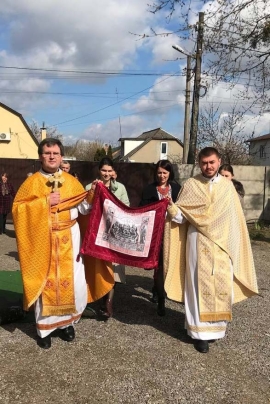Our daily lives, overnight, have been shattered by the sound of artillery and the whistles of missiles. I mean the daily routine of getting up with the red sky of sunrise or the gray sky of rain, the warmth of a fragrant breakfast, the kiss before leaving for work or school, the evening return, the shared meal, the safe night in your bed and in your bedroom... and dreams like all the dreams of normal people.
Since that day, all our tomorrows have changed, and today has become a nightmare, a constant tension, a total insecurity. The pieces, the fragments of our usual life, have remained, as if a completed puzzle had been undone. But we realised that war cannot "pause" life. Now it's up to us to reconstruct the everyday, to find a thread of meaning. Daily life is the only place where there can be no loss of meaning and the reconstruction of hope, growth in today, the promise of a future. We cannot wait for the end, when it can come through God's grace (and the commitment of human beings). In everyday life we must not survive, but live, and find reasons and ways to give meaning and taste to things. The daily life is not to pretend that nothing is happening, but to live every moment with the opportunity it offers us: family and friendship relationships, Sunday and weekly community meetings, children's play, school and study, charitable actions. Of course, with eyes, ears and legs well prepared to face danger. In this daily space (rarely without rubble), time is also precious, every moment is precious, every moment is felt as a gift from God, because the next moment may not be there.
Can this be a gift to you, to rediscover and re-evaluate the everyday in its beauty and gratuitousness and "wonder"? How can nature sometimes give us back (plants, animals, water) with its resilience?
But I do not intend to write cheap poetry. In this tiring daily life to be rebuilt, to be rediscovered, we are a people who suffer. Can we also offer this as a gift? Can one offer one's suffering as a gift? I think so, as an experience of human sharing and also as an experience of the mystical body. The passion and death of Christ led to the conversion of the human heart. I believe that the inhuman and unjust pain experienced in this dramatic time will be able to convert the human heart and rebuild it in peace.
I think that the reconstruction of Ukraine will start from this commitment to youth ministry: to shine light on consciences, and perhaps the gospel of the Beatitudes will help us, those who invoke peace and promise the gift of God to those who have suffered because of injustice.
I have spoken of everyday life as space and time (here and now) of the concreteness of life. But it is not an empty container. This daily life is inhabited, by people, by things, by ties, even by memories. It presents and demands a new way of being where the person, the young person rediscovers the importance of being there, of relationship, of the essential and of the little. I have seen these values rediscovered (I mean the "spirituality" of these values) that probably count or are worth little elsewhere, but here it is the distance between life and death, between full and empty, between meaning and insignificance, between light and darkness. If I had to leave only one message, I would leave this, precisely because it is essential and vital, and it is something that we have rediscovered with greater intensity in suffering, and we also entrust it as our treasure to all our friends.


